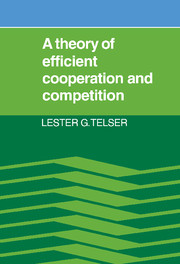Book contents
- Frontmatter
- Contents
- List of tables
- Preface
- Chapter 1 Prologue
- Chapter 2 Perceptions and reality: the genesis of the Sherman act
- Chapter 3 Competition, cooperation, and efficiency
- Chapter 4 Stable coalitions
- Chapter 5 Equilibrium with decreasing average cost: an application of the theory of the core illustrated by production and exchange among spatially separated markets
- Chapter 6 A theory of self-enforcing agreements
- Chapter 7 Some new results on duopoly applied to theories of Cournot, Bertrand, and Edgeworth
- Chapter 8 Rivalry by means of innovation
- References
- Index
Chapter 2 - Perceptions and reality: the genesis of the Sherman act
Published online by Cambridge University Press: 03 November 2009
- Frontmatter
- Contents
- List of tables
- Preface
- Chapter 1 Prologue
- Chapter 2 Perceptions and reality: the genesis of the Sherman act
- Chapter 3 Competition, cooperation, and efficiency
- Chapter 4 Stable coalitions
- Chapter 5 Equilibrium with decreasing average cost: an application of the theory of the core illustrated by production and exchange among spatially separated markets
- Chapter 6 A theory of self-enforcing agreements
- Chapter 7 Some new results on duopoly applied to theories of Cournot, Bertrand, and Edgeworth
- Chapter 8 Rivalry by means of innovation
- References
- Index
Summary
Introduction
The actions people take depend on what they believe is true. But what they believe is true, that is, their perceptions, may be only partly true or even wholly false. Even so, these perceptions of reality, not reality itself, affect their behavior. The effects of their actions do depend on reality and may in turn cause changes in their perceptions. People's knowledge is surely incomplete and partly wrong. Learning is the process of expanding and correcting the stock of knowledge. As there is learning so perceptions change. A theory of behavior that assumes there is a difference between what is true and what people believe to be true can make better predictions of what they will do than a theory assuming omniscience. As an illustration consider the problem of explaining which trade routes were used by merchants. By taking into account people's belief that the world was flat, we could make better predictions of the actual trade routes that were used until the beginning of the sixteenth century than by assuming that people knew the true shape of the earth. Only those who believe the earth is round would be willing to sail west in order to go to the Far East.
The better theory of behavior not only distinguishes between perception and reality but it also explains how and when people reduce the discrepancy between them. If an individual cannot change reality, then the theory must describe the conditions leading him to change his beliefs.
Information
- Type
- Chapter
- Information
- A Theory of Efficient Cooperation and Competition , pp. 10 - 47Publisher: Cambridge University PressPrint publication year: 1987
